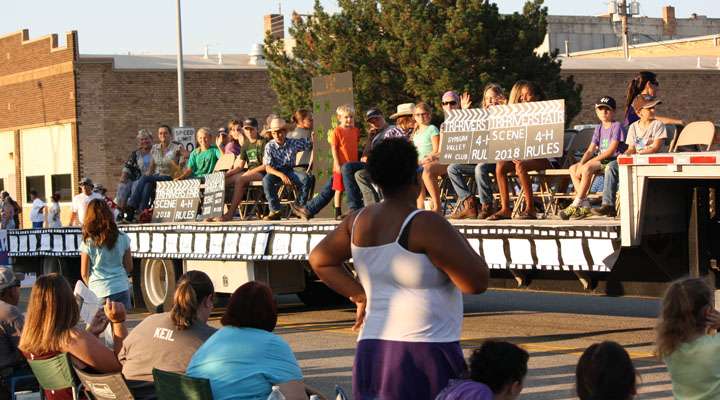The rows of cookies and muffins, rockets and cabinets and photographs and more may seem like interesting displays to passers-by at the county and state fairs.
But for thousands of Kansas 4-H members who will put their efforts on display this summer, they represent nearly a year’s worth of work and trial-and-error learning.
“The 4-H year begins in October with young people selecting the projects that they want to learn about the rest of the year,” said Amy Sollock, a 4-H youth development specialist in the southwest region. “So the exhibit that is brought to the fair is reflective of a year’s worth of work.”
Sollock said once county fair season hits – typically July and August– youth have had several chances to master their new skills and knowledge; some of those attempts are successful and some not-so-successful.
“We would expect that they would have a lot of practice rounds,” she said. “Of course nobody complains about having too many muffins around the house, or cookies. If it’s a craft or trade such as sewing or woodworking, what they choose to exhibit at the fair is a sample of their best work.”

Tri-Rivers Fair
For Saline County 4-Hers, the Tri-Rivers Fair is scheduled for Aug. 4-8 and is packed with activities. As the schedule stands now, the parade through downtown Salina will kick things off the night before. The parade is scheduled to begin at 7 p.m. Aug. 3 at the intersection of Elm Street and N. Santa Fe Avenue. It will travel south on Santa Fe Avenue to Prescott Avenue.
Loren Johnson is the scheduled grand marshal for the parade, which has the theme of "Barn to be Wild."
Organizations and businesses wanting to participate in the parade are asked to submit their entry forms by July 25. Entries received after July 25 will be placed at the end of the parade. Entry fees are as follows.
●Postmarked by July 25, $20 per business or $10 per non-profit organization
●Postmarked between July 26-31, $30 per business or $20 per non-profit organization
●Anything after July 31 (bring with you the day of the parade), $45 per business and $35 per non-profit organization.
There are no fees for 4-H club entries. There will be no refunds.
For more information about the Tri-Rivers Fair, visit tririversfair.org.
4-H tradition
Sollock said one of the traditions of 4-H projects is that youth are mentored by adults. Sometimes that’s a club leader or project leader, or maybe a parent who happens to have knowledge in a given area.
“4-H programs are designed to have a lot of adult volunteers in place to make sure that our kids are learning appropriately for their age and skill level and that they get some guidance and coaching throughout the year,” Sollock said.
K-State Research and Extension agents can provide a fair book that includes the criteria for entering projects in the county fair, where the projects are displayed and judged by experts in the given area.
“That’s the part I love the most about any county fair: Kids sit down with an adult who has expertise in a given project area and they have a conversation about what the exhibit is,” Sollock said. “If it’s an art or photography project, for example, youth will sit down and have a conversation with the adult about why they chose to take the photo, and maybe the lighting and the settings they used on their camera. The judges provides feedback about what worked well, what the 4-H member could have done differently… and encourage them to continue their learning experience.”
. . .
K-State Research and Extension contributed to this story.





